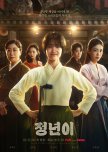Gay subtext meets historical drama
"She already knows how to make women fall for her without consciously thinking about it ..." (episode 6, 17:43)
"I never knew those two [girls] could have such chemistry, they're bringing out the best in each other" (episode 6, 51:47)
"Jeong Nyeon" is more than a glimpse into a woman-centric world of acting. The setting of a woman-only theater that positions women as both the objects and subjects of romantic desire naturally lends itself to a subtextual exploration of same-sex attraction. It's a glimpse into the potential for better gay representation in Korean media
Though the production team’s decision to remove Jeong Nyeon’s female love interest (Kwon Bu Yong) and the explicit same-sex romance is a regrettable concession to society's homophobic expectations (they should've done better), the drama remains commendable for its efforts to integrate elements of gayness throughout the narrative. I was impressed by everyone's performances
"The stars that graced the gukgeuk stage went on to continue their paths as artists, pansori singers, outdoor theatre performers, or even film actors. They have merely dispersed, not disappeared"
That the curtain has fallen on Maeran's story need not spell the end for female gukgeuk. The genre deserves to rise from the ashes, and girls/women should have the chance to soar on its stage again
"I never knew those two [girls] could have such chemistry, they're bringing out the best in each other" (episode 6, 51:47)
"Jeong Nyeon" is more than a glimpse into a woman-centric world of acting. The setting of a woman-only theater that positions women as both the objects and subjects of romantic desire naturally lends itself to a subtextual exploration of same-sex attraction. It's a glimpse into the potential for better gay representation in Korean media
Though the production team’s decision to remove Jeong Nyeon’s female love interest (Kwon Bu Yong) and the explicit same-sex romance is a regrettable concession to society's homophobic expectations (they should've done better), the drama remains commendable for its efforts to integrate elements of gayness throughout the narrative. I was impressed by everyone's performances
"The stars that graced the gukgeuk stage went on to continue their paths as artists, pansori singers, outdoor theatre performers, or even film actors. They have merely dispersed, not disappeared"
That the curtain has fallen on Maeran's story need not spell the end for female gukgeuk. The genre deserves to rise from the ashes, and girls/women should have the chance to soar on its stage again
Vond je deze recentie nuttig?





















